23 Exotic And Unusual Plants To Consider Growing In Your Greenhouse

Reviewed By COLIN SKELLY

Colin is a Horticulturist and Horticultural Consultant with experience in a range of practical and managerial roles across heritage, commercial and public horticulture. He holds the Royal Horticultural Society’s Master of Horticulture award and has a particular interest in horticultural ecology and naturalistic planting for habitat and climate resilience.
IN THIS GUIDE
- 1) Bougainvillea
- 2) Kumquat
- 3) Night-Blooming Jasmine
- 4) Citrus reticulata ‘Kinnow’
- 5) Arabian Jasmine
- 6) Many-Flowered Jasmine
- 7) Frangipani
- 8) Yellow Sage
- 9) Orange Clock Vine
- 10) Blue Trumpet Vine
- 11) Chinese Hibiscus
- 12) Pineapple
- 13) Tomato
- 14) Red-Hot Cat’s Tail
- 15) Pseuderanthemum carruthersii
- 16) Sensitive Plant
- 17) Glory Tree
- 18) Blue Vine
- 19) Golden Dewdrop
- 20) Melon ‘Galia’
- 21) Cucamelon
- 22) Egyptian Water Lily
- 23) Green Ebony Tree
You can use your greenhouse to grow the most beautiful and exotic plants that are far too tender to grow in the UK without one.
Before we proceed further on this thought, a word to the wise.
Simply putting tender plants inside a greenhouse is no guarantee of success, as tropical and sub-tropical plants have their own diverse requirements when it comes to soil, sun, shade, watering and humidity.
Therefore, I strongly advise you to choose a few plants and then educate yourself on how to go about growing those.
My aim with this list is to introduce you to fantastic plants, many of them exotic, that you may have heard or read about, and, I hope, a few that are entirely new to you.
None of them have a hardiness rating any greater than H2 and all are tropical or sub-tropical in origin, requiring a greenhouse to grow with a high degree of success, to ensure proper flowering and a reasonable lifespan.
1) Bougainvillea
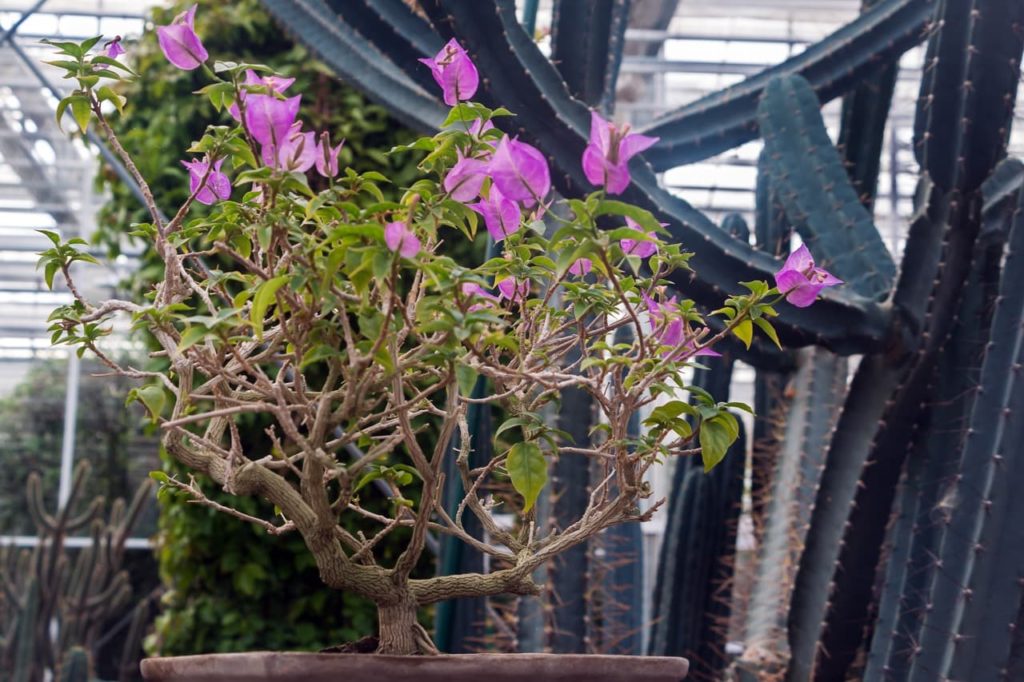
- HARDINESS RATING: H2
- FOLIAGE: evergeen
- FLOWERS: varies
- FLOWERING SEASON(S): summer
A large climber, this plant does not need any special care once it gets of the ground except, of course, protection from low temperatures.
Established shrubs are even drought-resistant.
In a hobbyist greenhouse, grow it in a very large container and it will produce those brilliantly coloured bracts year round.
2) Kumquat
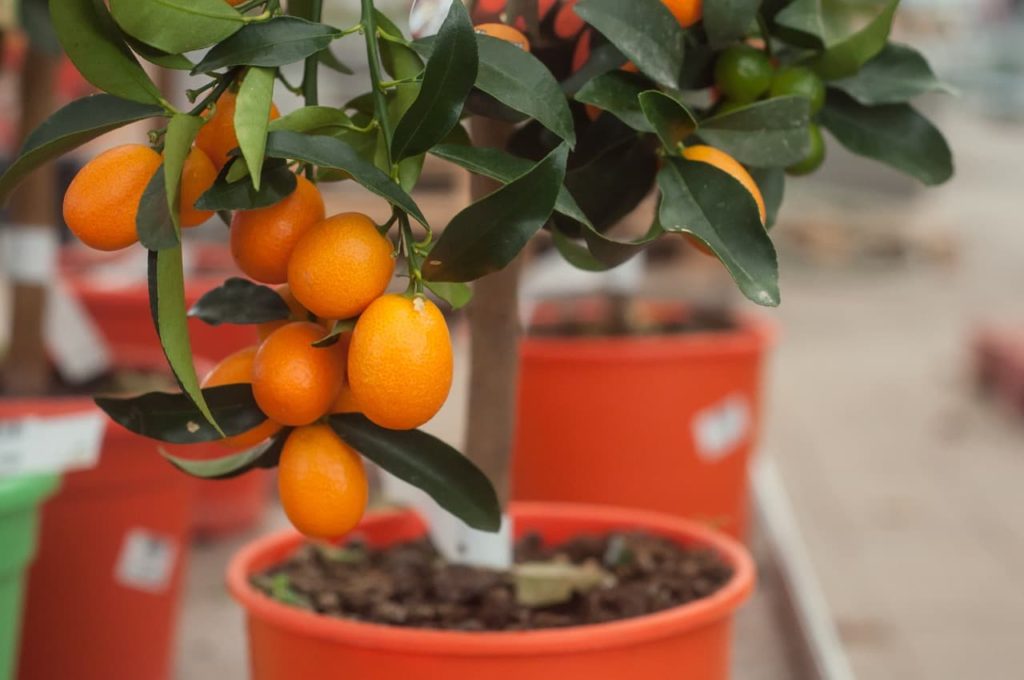
- BOTANICAL NAME(S): Citrus kinokuni / Fortunella margarita
- HARDINESS RATING: H1C
- FOLIAGE: evergreen
- FLOWERS: white
- FLOWERING SEASON(S): spring / summer
- FRUITING SEASON(S): summer / autumn
These small citrusy fruits are rather like oranges but about the size of a large berry and, like berries but unlike oranges, they are not peeled – but they taste more like oranges than berries!
You can grow this little tree in a pot or in open ground.
Either way, you’ll get pretty sweetly-scented flowers and tangy-sweet fruit for several months of the year.
This is an RHS AGM winner.
3) Night-Blooming Jasmine
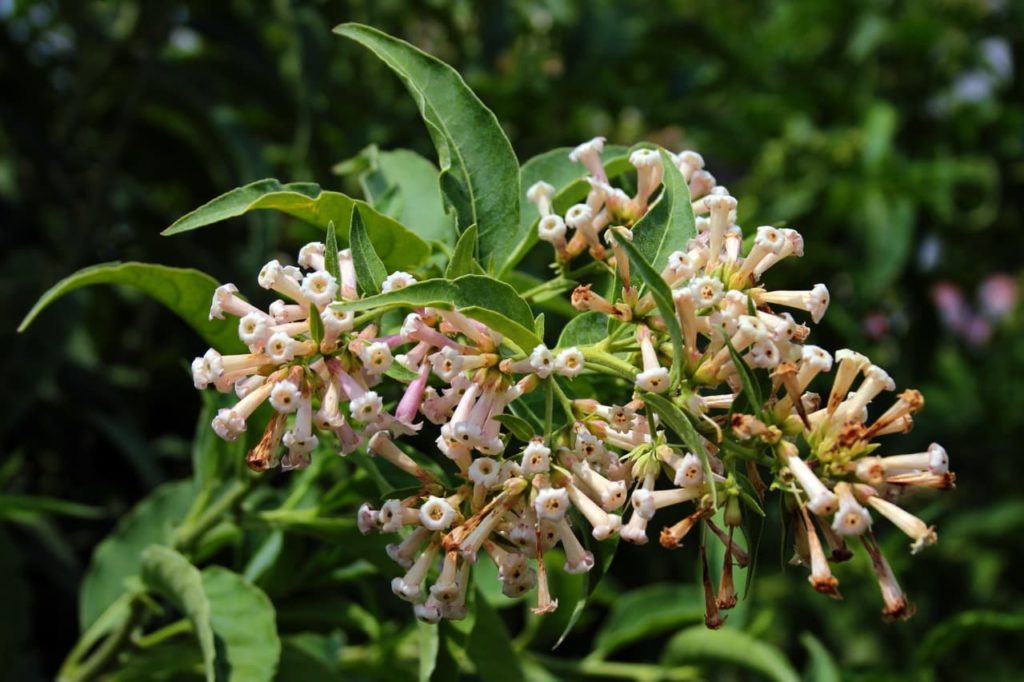
- BOTANICAL NAME: Cestrum nocturnum
- HARDINESS RATING: H2
- FOLIAGE: evergreen
- FLOWERS: green, cream and white
- FLOWERING SEASON(S): summer / winter
- FRUITING SEASON(S): autumn
Although this is a sprawling, much-branched shrub that can grow to over 3m, Night-Blooming Jasmine grows easily in pots.
You’ll be charmed to see its little flowers open at twilight and last until daybreak.
They are small, pure white and trumpet-like, making quite a contrast with the flappy leaves.
These tiny little flowers have a wonderfully sweet, heady perfume.
4) Citrus reticulata ‘Kinnow’
- HARDINESS RATING: H2
- FOLIAGE: evergreen
- FLOWERS: white
- FLOWERING SEASON(S): spring
- FRUITING SEASON(S): autumn / winter / spring
An orange similar to Mandarins, the ‘Kinnow’ fruit is deliciously tangy with a touch of sweetness.
This cultivar is prolific and bears very fragrant white blossoms and produces copious amounts of vibrant orange fruit for most of the year.
If your greenhouse is large enough, root it in open ground.
5) Arabian Jasmine
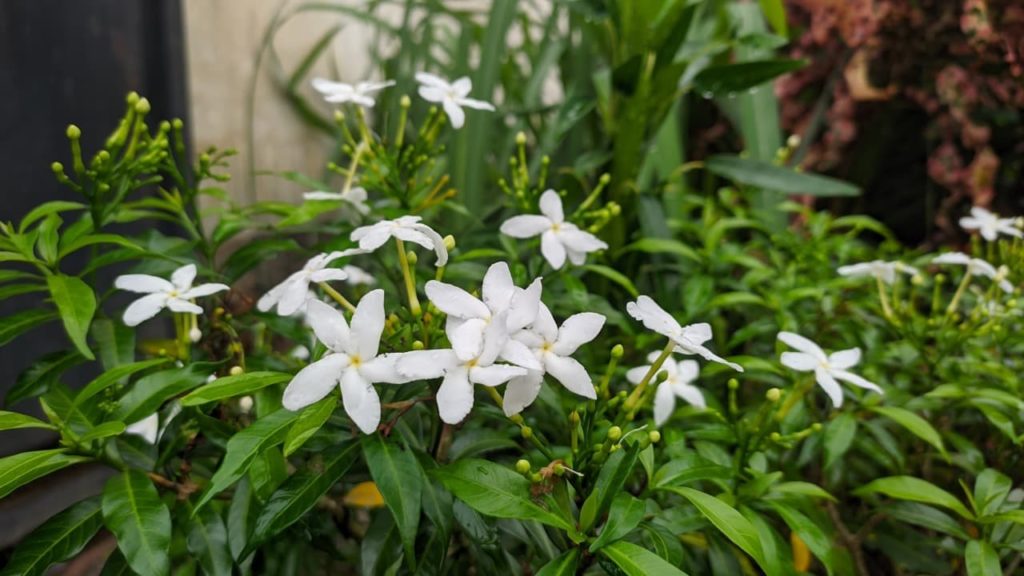
- BOTANICAL NAME: Jasminum sambac
- HARDINESS RATING: H2
- FOLIAGE: evergreen
- FLOWERS: white
- FLOWERING SEASON(S): summer
An evergreen shrub that makes a tidy bush, Arabian Jasmine also produces flowers that open in the evening and last for but a night.
The little pure white blooms are borne in profusion and they are so fragrant that the air is scented to a few feet from the bush.
A recipient of the RHS AGM.
6) Many-Flowered Jasmine
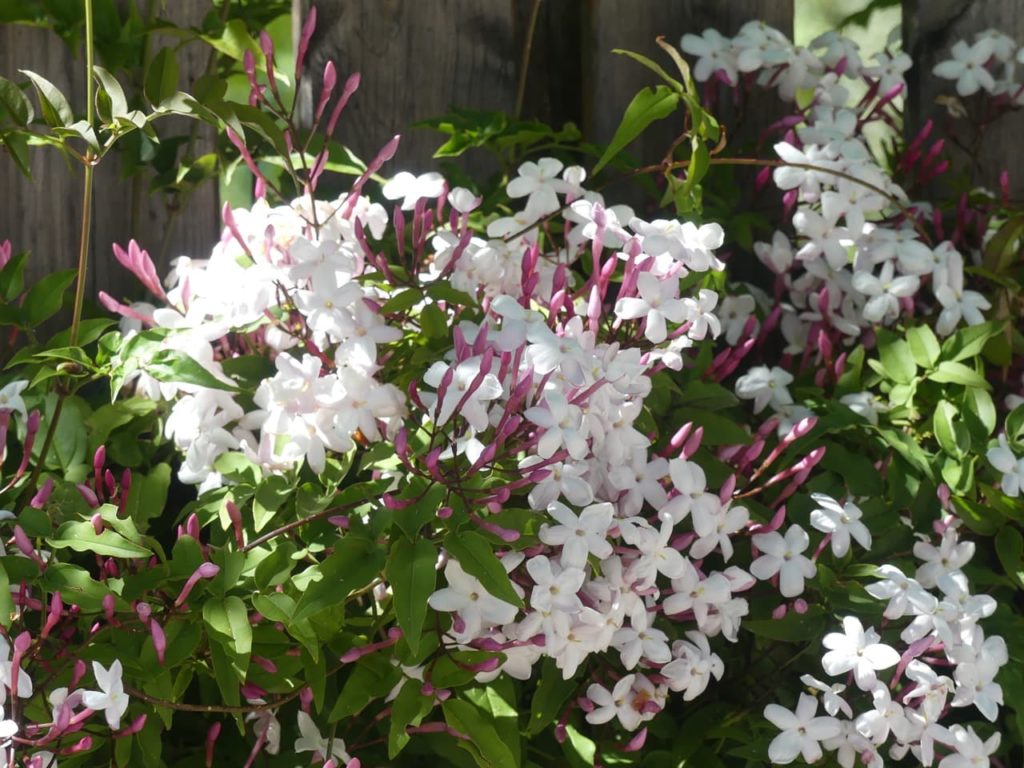
- BOTANICAL NAME: Jasminum polyanthum
- HARDINESS RATING: H2
- FOLIAGE: evergreen
- FLOWERS: white
- FLOWERING SEASON(S): winter / spring
If planted in a big pot, Many-Flowered Jasmine will happily adopt the habit of a sprawling bush, showing off its deep green compound leaves.
It deserves its name because in blooming season, this plant simply covers itself in tubular star-shaped white flowers borne in big clusters.
The flowers have a sweet fragrance and are in bloom from late winter onward.
Another winner of the RHS AGM.
7) Frangipani
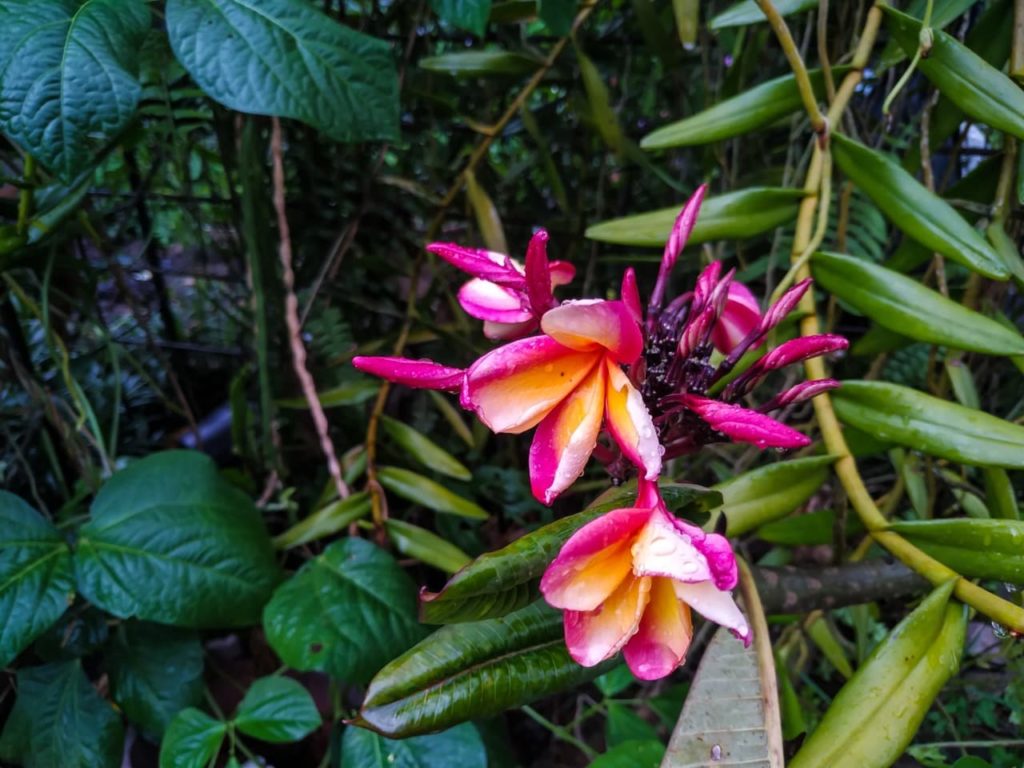
- BOTANICAL NAME: Plumeria rubra
- HARDINESS RATING: H1B
- FOLIAGE: deciduous
- FLOWERS: yellow and pink
- FLOWERING SEASON(S): summer / autumn
A naturally even and fine-branched small tree with a ringed and knobbly type of quasi-bark, Frangipani has deep green oblong leaves that are observably turgid.
It produces very many salver-shaped, sometimes bowl-shaped, 8cm flowers with 5 overlapping petals.
They are white with a yellow blaze or in shades of pink and exude a sweet fragrance.
An RHS AGM recipient.
8) Yellow Sage
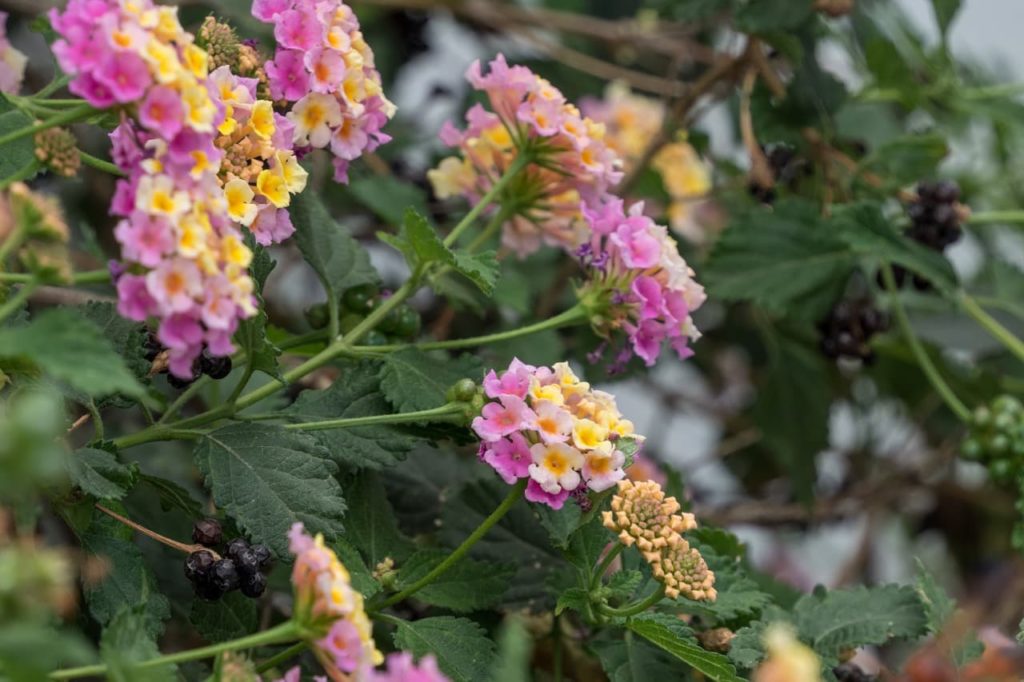
- BOTANICAL NAME: Lantana camara
- HARDINESS RATING: H1C
- FOLIAGE: evergreen
- FLOWERS: red and yellow
- FLOWERING SEASON(S): spring / summer / autumn
A very woody shrub, often awkwardly-branched, Lantana camara has deep green rough-textured foliage that has a bracing, fresh, clove-musk scent.
Its flowers are in the form of semi-rounded terminal clusters with numerous florets.
As each cluster displays many tones of a single colour in shades of white, almond, and cream, the effect is delightfully unique.
9) Orange Clock Vine

- BOTANICAL NAME: Thunbergia gregorii
- HARDINESS RATING: H1B
- FOLIAGE: evergreen
- FLOWERS: orange
- FLOWERING SEASON(S): summer
Orange Clock Vine is an evergreen twining vine.
Its foliage is of an intense brilliant green shade.
All through summer it produces copious numbers of salver-shaped flowers up to 4cm wide.
They are of a unique orange colour; a light yet saturated amber-orange tone.
In view of this plant’s agreeable dimensions, it is easily grown in a large pot.
Another RHS AGM recipient.
10) Blue Trumpet Vine
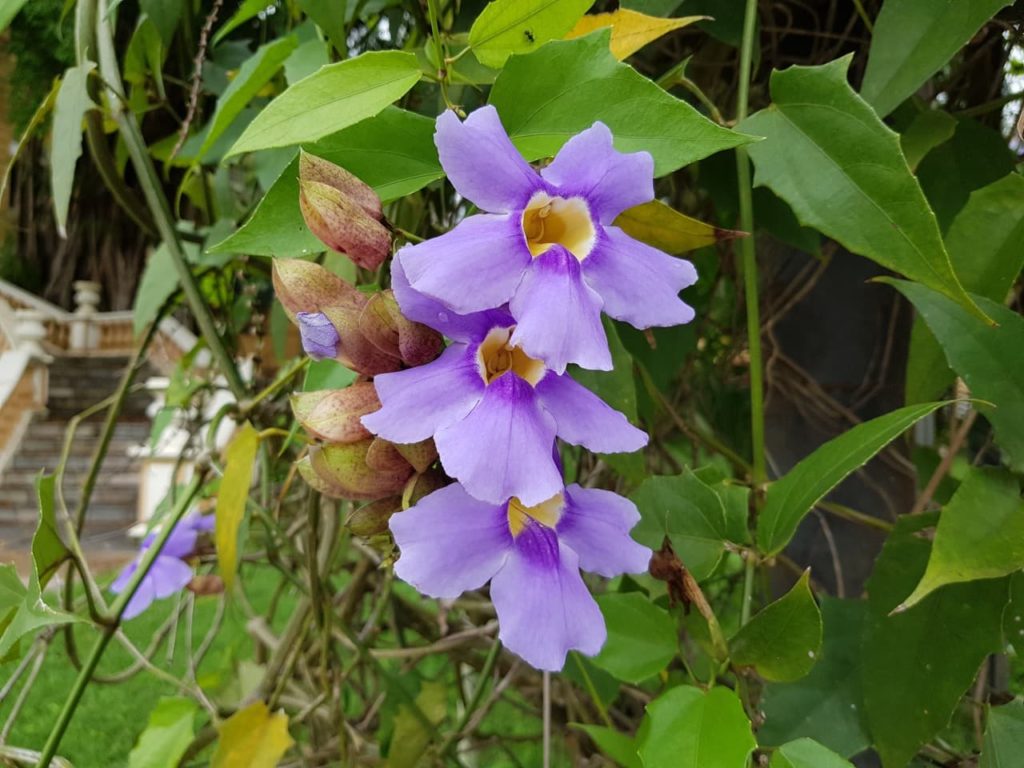
- BOTANICAL NAME: Thunbergia grandiflora
- HARDINESS RATING: H1B
- FOLIAGE: evergreen
- FLOWERS: blue and white
- FLOWERING SEASON(S): summer
A strong evergreen climber, Bengal Clock Vine has many twining stems.
The semi-cordate leaves are a brilliant shade of green and in the summer, the plant produces a profusion of flowers.
These exotic blooms are not so much trumpet-shaped as bowl-shaped and are seen in hues ranging from lilac through slate blue to purple, all with a yellow throat.
This plant has received an Award of Garden Merit from the RHS.
11) Chinese Hibiscus
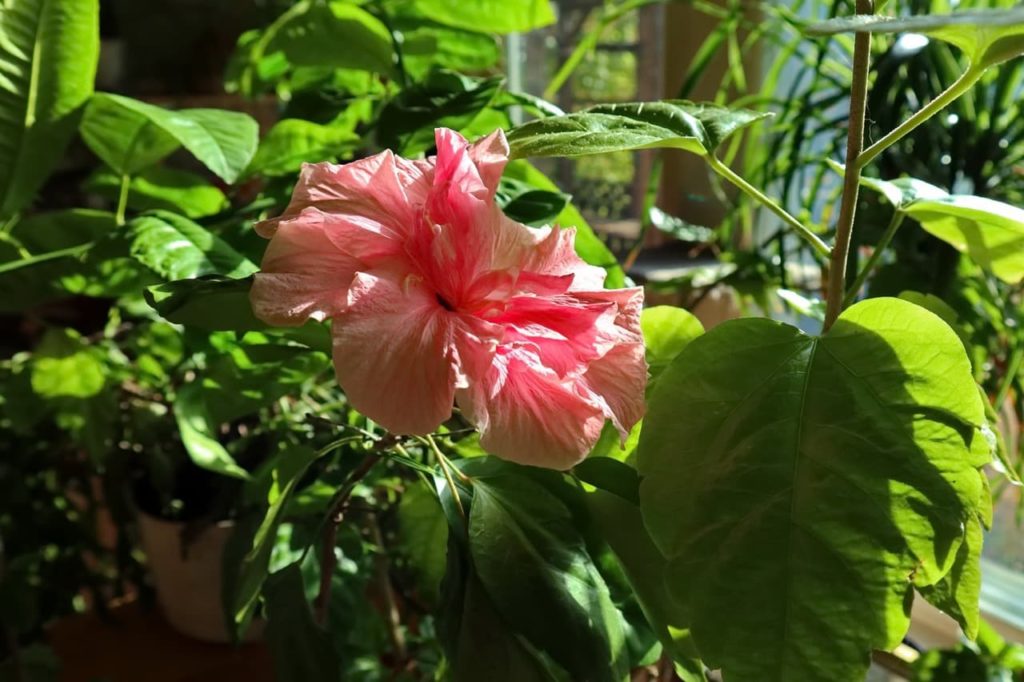
- BOTANICAL NAME: Hibiscus rosa-sinensis
- HARDINESS RATING: H1B
- FOLIAGE: evergreen
- FLOWERS: orange, white, red and yellow
- FLOWERING SEASON(S): summer
An evergreen with a bushy, tidy form, Chinese Hibiscus produces very large but delicate-looking flowers with ruffled and frilly petals and prominent stamens.
Colours include red and magenta, but also pastel pink and mellow orange.
Variegated cultivars are worth growing for the foliage alone.
It is unevenly mottled and speckled in green, cream and white with pink bleeds.
12) Pineapple
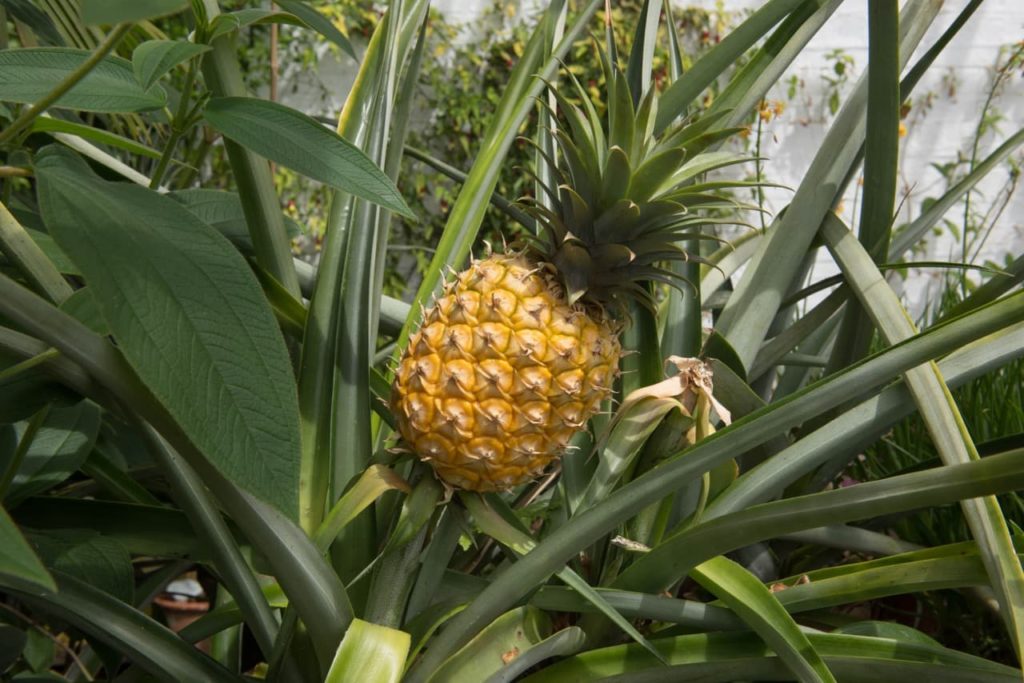
- BOTANICAL NAME: Ananas comosus
- HARDINESS RATING: H1A
- FOLIAGE: evergreen
- FLOWERS: purple and yellow
- FLOWERING SEASON(S): summer
Bring a bit of Hawaii to your chilly corner in the Midlands by growing Pineapples.
In a greenhouse, you can plant them in open ground where they’ll be larger than when grown in large pots.
Another greenhouse bonus – no need to lug around big pots for overwintering!
“In the eighteenth and nineteenth centuries, gardeners used dung and tanner bark to heat glasshouse beds to grow pineapples,” shares Colin Skelly, a Horticultural Consultant.
“Today a greenhouse heater can save on labour but would still make your home-grown pineapple a costly endeavour!”
This tangy-sweet fruit simply bursts with its unique rich flavour when whole and fresh, even more so when juiced.
13) Tomato
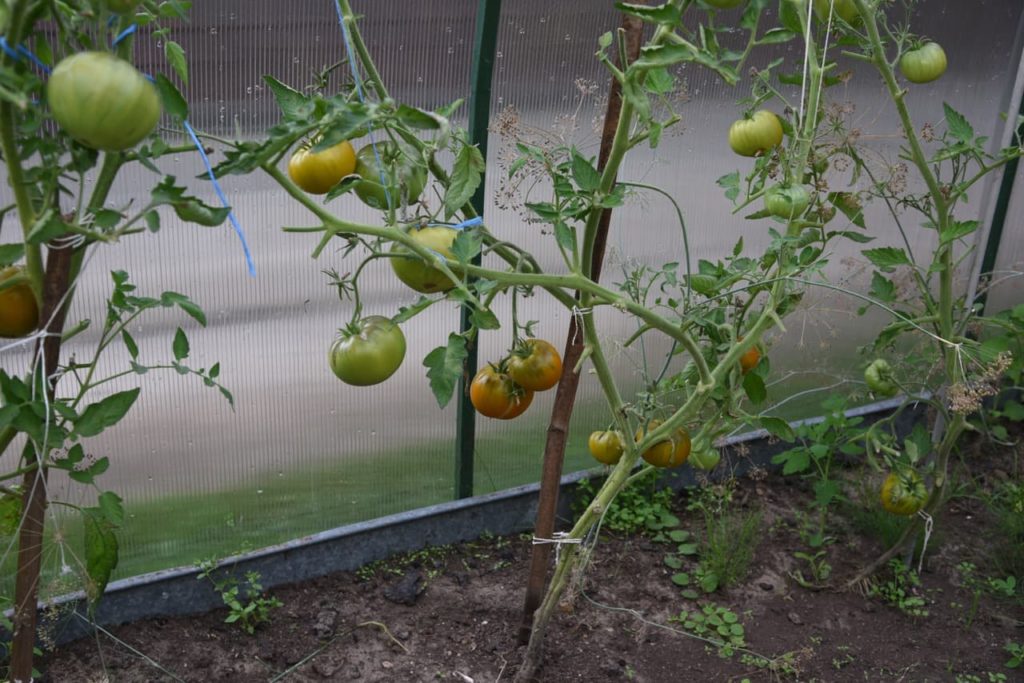
- BOTANICAL NAME: Solanum lycopersicum
- HARDINESS RATING: H1C
- FOLIAGE: evergeen
- FLOWERS: yellow
- FLOWERING SEASON(S): spring / summer
- FRUITING SEASON(S): summer
Of course, you can grow tomatoes as annuals in your garden, but if you have a greenhouse, you can grow this much-loved veggie (okay, fruit) how it grows in Central America – as a perennial.
An optimal variety will produce copious fruit for several years.
You could actually try several varieties and see which is the best-performing perennial.
14) Red-Hot Cat’s Tail
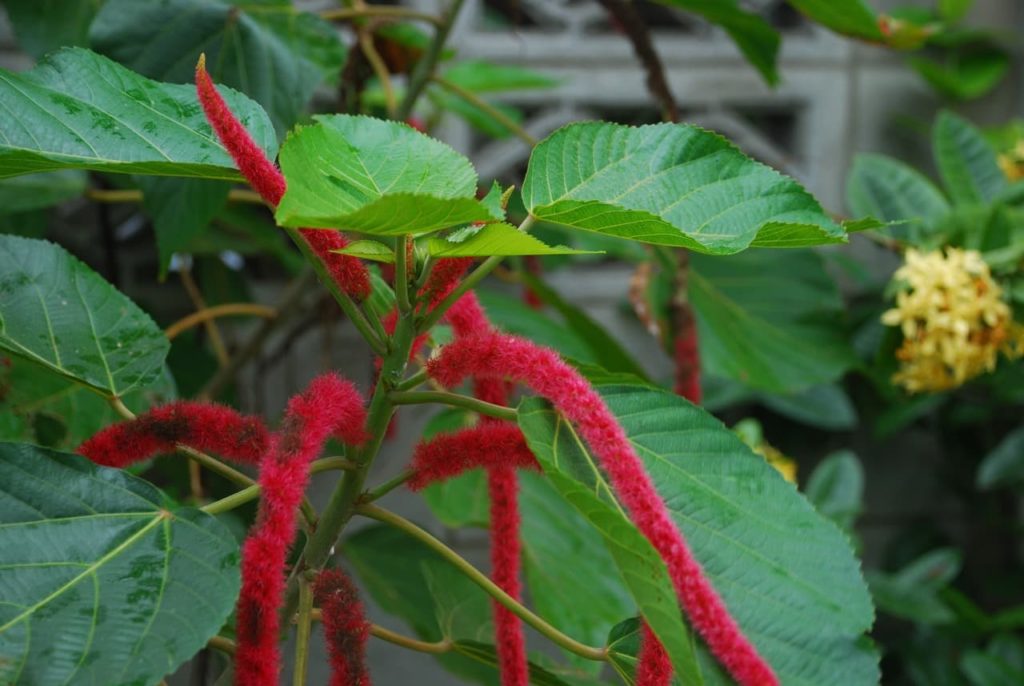
- BOTANICAL NAME: Acalypha hispida
- HARDINESS RATING: H1B
- FOLIAGE: evergreen
- FLOWERS: red
- FLOWERING SEASON(S): spring / summer / autumn / winter
Acalypha hispida is a little woody shrub and its story has to begin with its foliage, for it has textbook leaves.
They are medium in size and are best described as ovate-elliptic-acuminate, finely serrated and of a lush green shade.
Up and down the plant range, its unusual flowers, which are curving, pendent, fuzzy, furry catkins of a vibrant red hue, are typically 15-25cm long.
A recipient of the RHS Award of Garden Merit.
15) Pseuderanthemum carruthersii

- HARDINESS RATING: H1C
- FOLIAGE: deciduous
- FLOWERS: white
- FLOWERING SEASON(S): summer
From the South Pacific, Pseuderanthemum carruthersii is a good-sized evergreen shrub of open habit.
It has brilliant light green ovate leaves which often display yellow marbled venation.
It produces the prettiest of little blooms in terminal clusters.
Somewhat like tiny propellers, the petals are often askew.
They are snowy white with a magenta-maroon throat and medial freckles.
16) Sensitive Plant
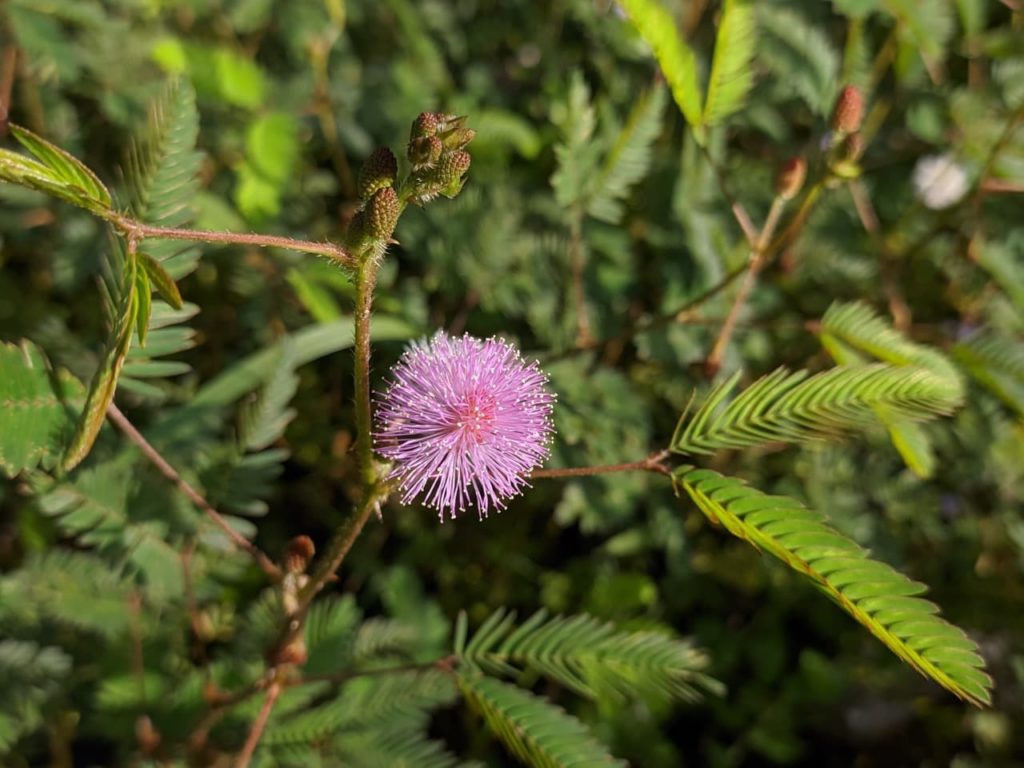
- BOTANICAL NAME: Mimosa pudica
- HARDINESS RATING: H1B
- FOLIAGE: evergreen
- FLOWERS: pink and purple
- FLOWERING SEASON(S): summer
Possibly the shyest member of the plant kingdom, this plant has bright green pinnate leaves.
Depending on how you touch them, all the pinnate leaves close inward in unison or opposing pairs close in succession.
The wispy flower is unique and attention-grabbing, as it is globular with radiating stiffish filaments.
The colour ranges from pastel pink to light purple. This plant is a short-lived evergreen.
17) Glory Tree
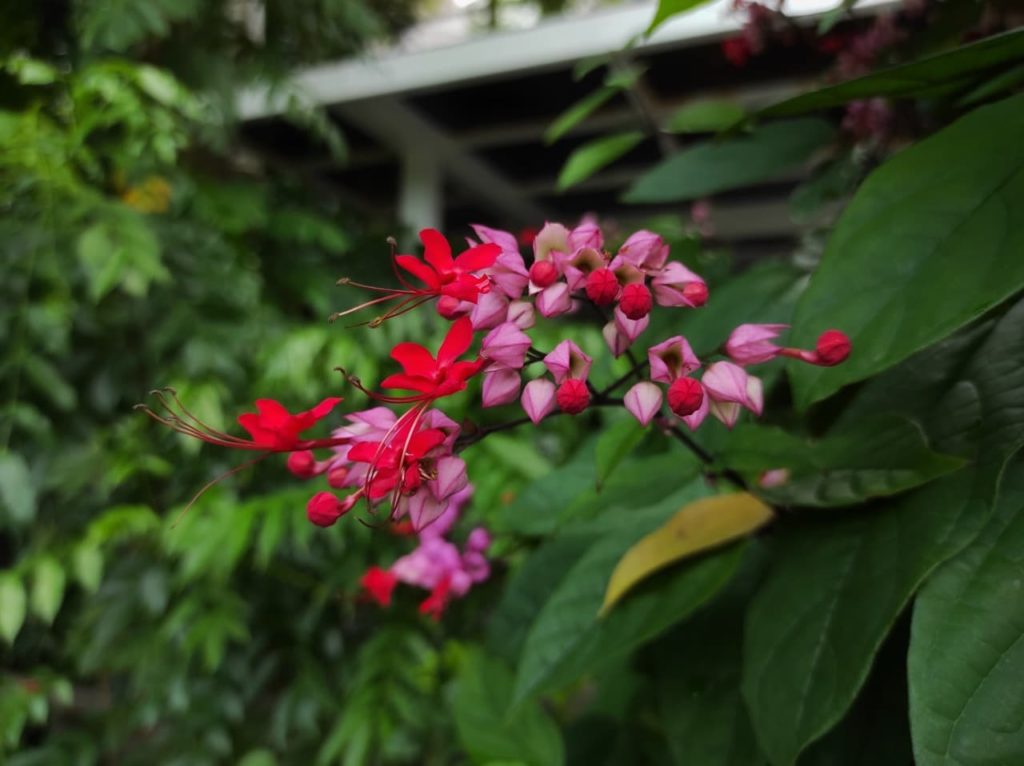
- BOTANICAL NAME: Clerodendrum splendens
- HARDINESS RATING: H1B
- FOLIAGE: evergreen
- FLOWERS: red
- FLOWERING SEASON(S): summer
Clerodendrum splendens has a slender woody stem with many twining branches that can attain great heights, but the overall size can be controlled in a container.
It has dark leaves that are ovate-to-rounded and somewhat wavy.
In summer, it bursts into a spectacular bloom with countless little five-petalled flowers with long, curved stamens.
The hue ranges from fiery orange to vivid scarlet.
This plant has an RHS AGM.
18) Blue Vine
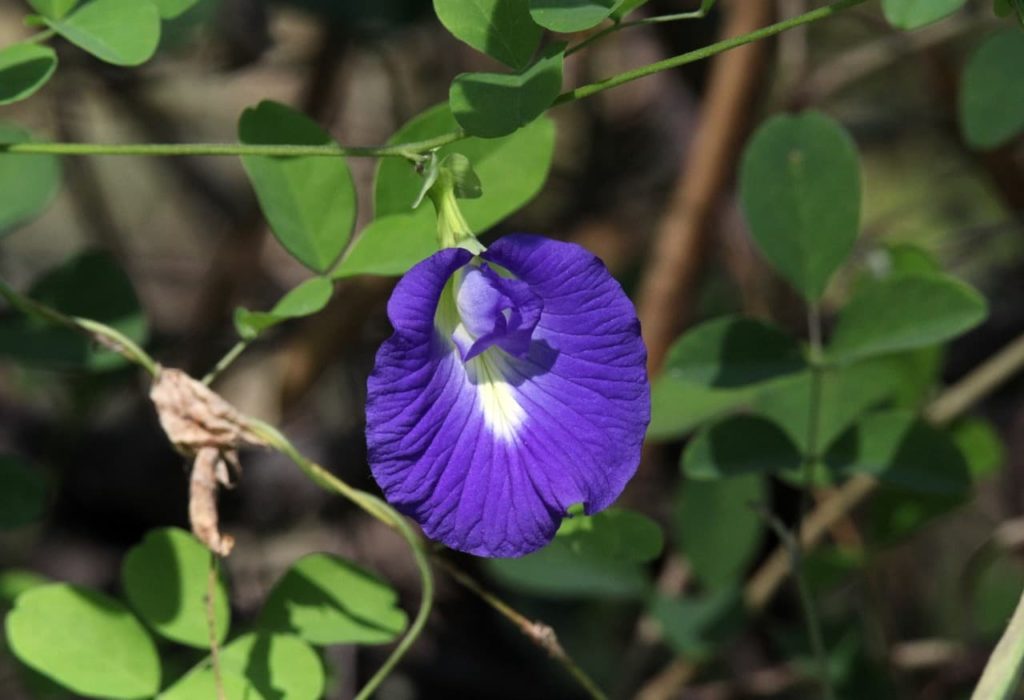
- BOTANICAL NAME: Clitoria ternatea
- HARDINESS RATING: H1C
- FOLIAGE: deciduous
- FLOWERS: blue and purple
- FLOWERING SEASON(S): summer
Blue Vine is a scrambling type of evergreen that would work very well in a container.
Its elliptic leaves are that perfect shade of leafy green.
The habit of this plant gives it a semi-dense, cushiony look.
Its beautiful flowers are laterally symmetric with a hood above and vary from purple to blue with a creamy centre.
The petals exhibit a type of narrow parallel ribbing.
19) Golden Dewdrop
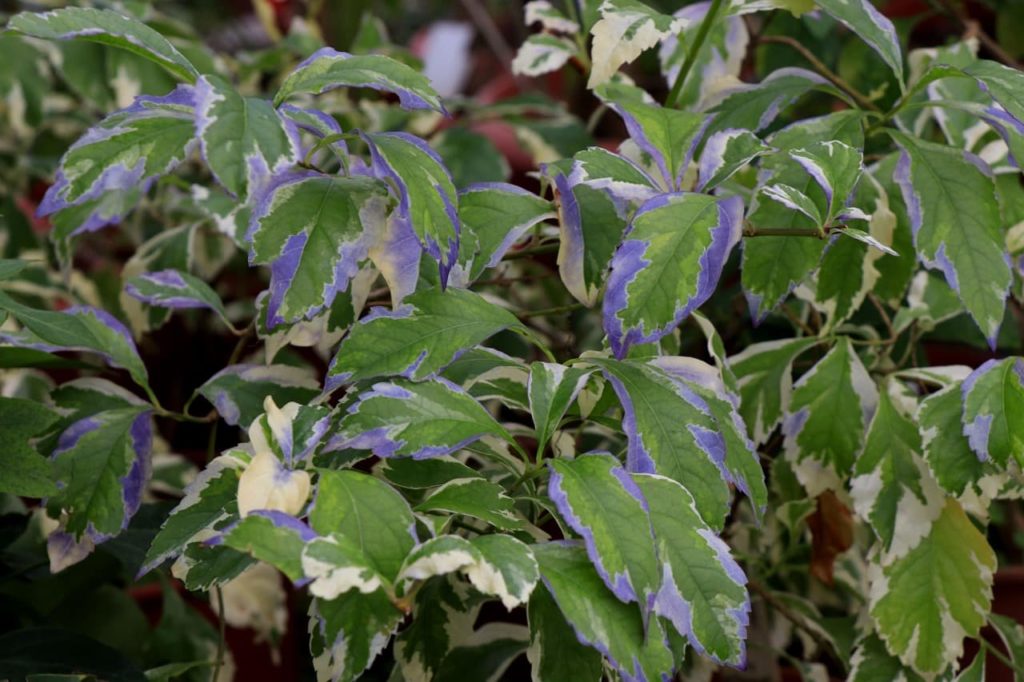
- BOTANICAL NAME: Duranta erecta
- HARDINESS RATING: H2
- FOLIAGE: evergreen
- FLOWERS: blue and purple
- FLOWERING SEASON(S): summer
A robust evergreen shrub with arcing stems and elliptic-ovate leaves of a soothing summery green, Duranta erecta grows very well in pots.
Although its main blooming season is late spring and summer, it blooms on and off year round.
The small flowers occur as drooping terminal clusters, sometimes thick and frothy.
The tones range from a gentle lavender to deep violet, often with lighter edging.
20) Melon ‘Galia’
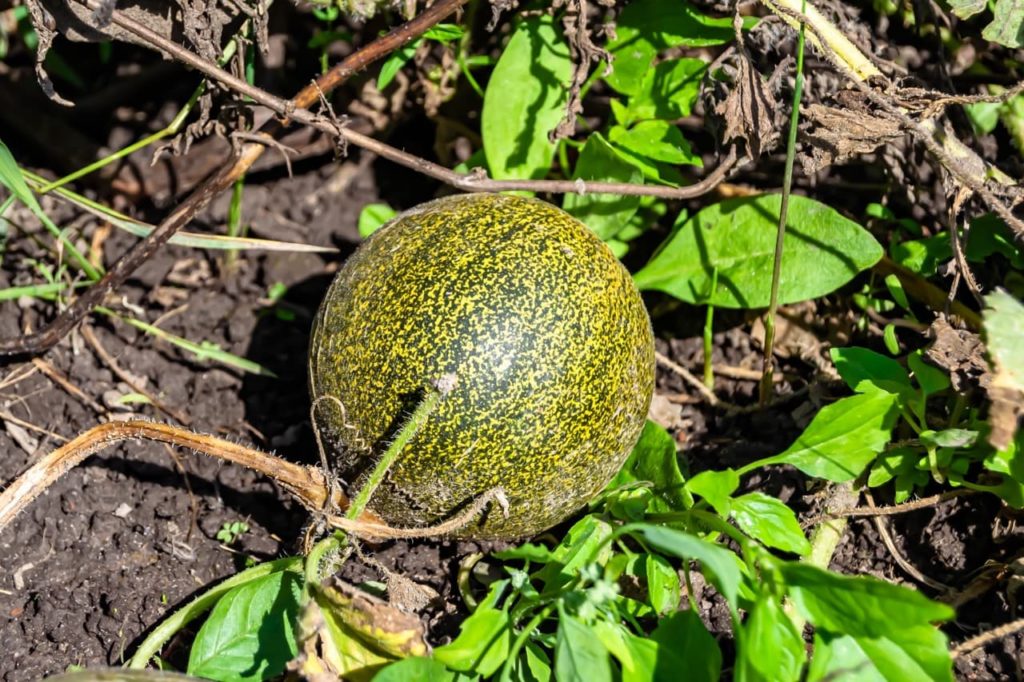
- BOTANICAL NAME: Cucumis melo ‘Galia’
- HARDINESS RATING: H1C
- FOLIAGE: deciduous
- FRUITING SEASON(S): summer
Classed as a twining climber, ‘Galia’ is more like a trailing vine and will happily sprawl on the ground.
Although it is difficult to grow in the UK, with a greenhouse you’re all set!
It is worth noting that there are very many cultivars of Cucumis melo, but the one suggested has large round fruit with white flesh flushed yellowish-green and is very sweet and juicy.
21) Cucamelon
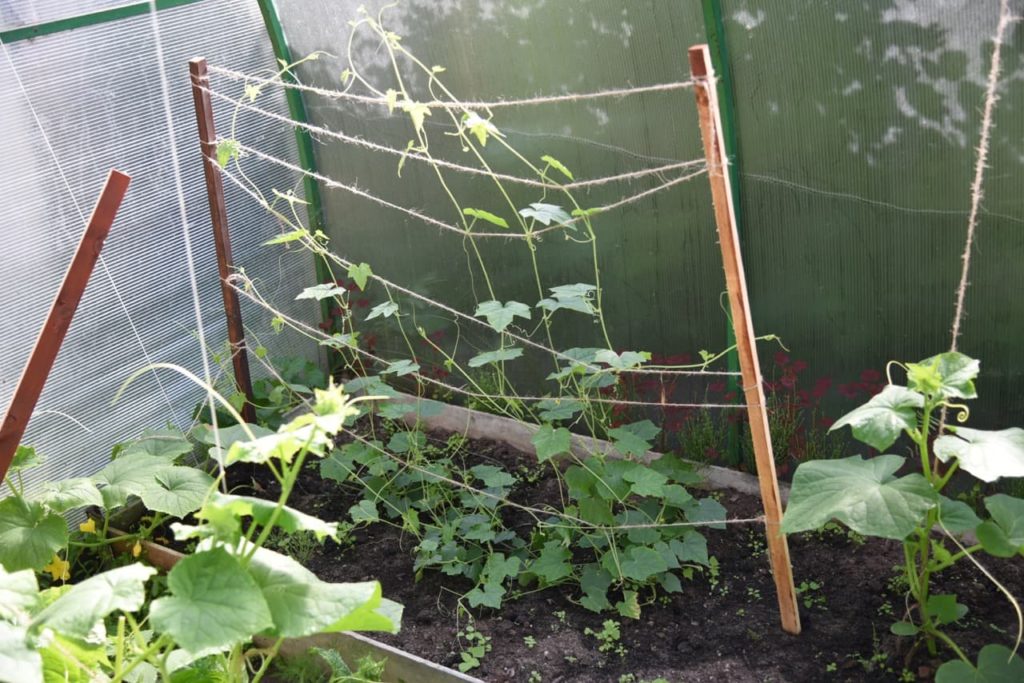
- BOTANICAL NAME: Melothria scabra
- HARDINESS RATING: H1C
- FOLIAGE: deciduous
- FLOWERS: yellow
- FLOWERING SEASON(S): summer
- FRUITING SEASON(S): summer / autumn
An interesting deciduous perennial that climbs with tendrils, Cucamelon is even more intriguing for its fruit.
During summer, it produces little yellow flowers which start forming into fruit by late summer.
These are oval to oblong with creamy spots on a green ground.
Only about 4cm long, these succulent and tangy cucumber-like treats are perfect with martinis.
22) Egyptian Water Lily
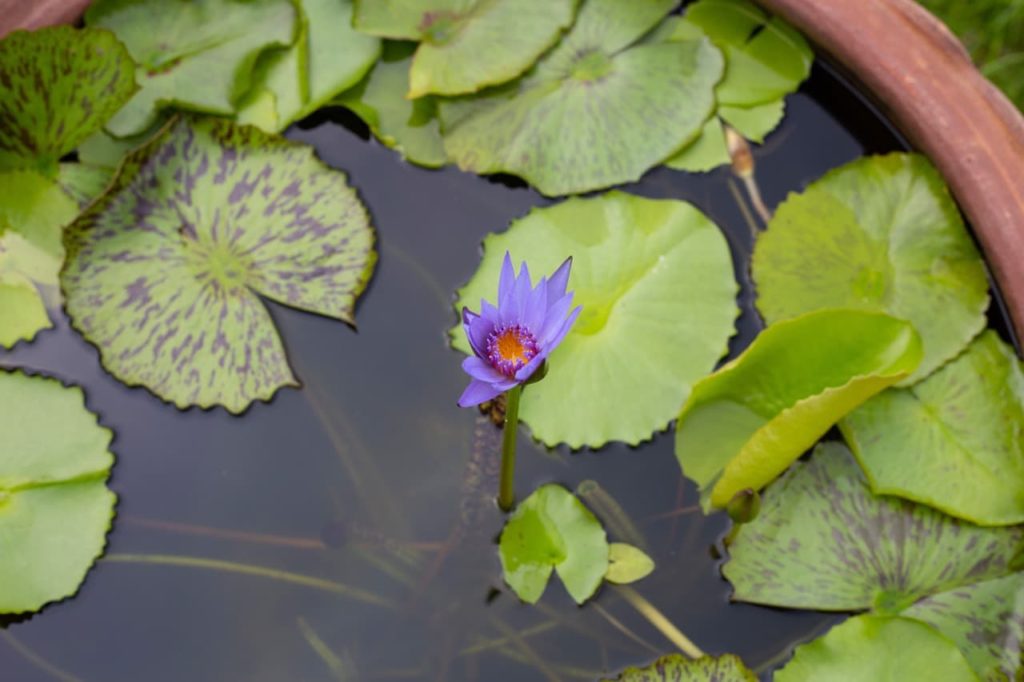
- BOTANICAL NAME: Nymphaea lotus
- HARDINESS RATING: H2
- FOLIAGE: deciduous
- FLOWERS: white and yellow
- FLOWERING SEASON(S): summer / autumn
If you can set up a little pool in your greenhouse, you could grow one of the rarest flowers in UK gardens: Lotus.
Its foliage floats on the water and these lily pads are crinkly, circular and dark green.
Conversely, the flowers are typically white with a central yellow bud with pink variants available.
These bowl-shaped, star-like flowers which open at dusk, are huge and grow to be up to 20-25cm.
23) Green Ebony Tree
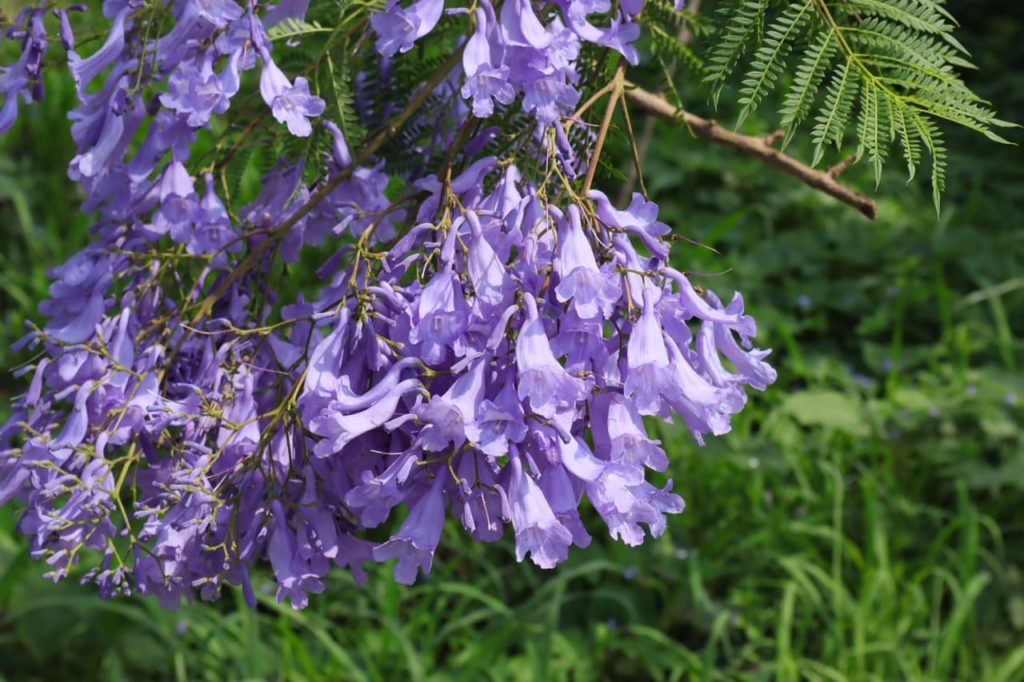
- BOTANICAL NAME: Jacaranda mimosifolia
- HARDINESS RATING: H2
- FOLIAGE: deciduous
- FLOWERS: blue and purple
- FLOWERING SEASON(S): spring / summer
Though Jacaranda mimosifolia can easily grow to 15m tall, it can be grown in a large container and pruned for size.
Its compound pinnate leaves are of a marvellous light, summery green shade.
The sensuous 5cm wide trumpet-shaped flowers occur in thick panicles and come in numerous shades of blue, purple and violet.

